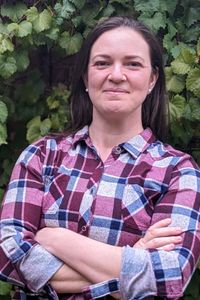Sarah Taber
Sarah Taber (Democratic Party) ran for election for North Carolina Commissioner of Agriculture. She lost in the general election on November 5, 2024.
Taber completed Ballotpedia's Candidate Connection survey in 2024. Click here to read the survey answers.
Biography
Sarah Taber lives in Fayetteville, North Carolina. Taber earned a bachelor's degree from Brigham Young University and a doctoral degree in plant medicine from the University of Florida. Her career experience includes helping launch vegetable greenhouses and indoor farms, working as a postdoctoral researcher in beekeeping, auditing safety in food and agriculture systems, working as a farm and food systems trainer, and writing and producing the podcast Farm to Taber.[1][2]
Elections
2024
See also: North Carolina Agriculture Commissioner election, 2024
General election
General election for North Carolina Commissioner of Agriculture
Incumbent Steve Troxler defeated Sarah Taber and Sean Haugh in the general election for North Carolina Commissioner of Agriculture on November 5, 2024.
Candidate | % | Votes | ||
| ✔ |  | Steve Troxler (R) | 52.6 | 2,922,483 |
 | Sarah Taber (D)  | 44.9 | 2,496,474 | |
 | Sean Haugh (L) | 2.4 | 135,513 | |
| Total votes: 5,554,470 | ||||
 = candidate completed the Ballotpedia Candidate Connection survey. = candidate completed the Ballotpedia Candidate Connection survey. | ||||
| If you are a candidate and would like to tell readers and voters more about why they should vote for you, complete the Ballotpedia Candidate Connection Survey. | ||||
Do you want a spreadsheet of this type of data? Contact our sales team. | ||||
Democratic primary election
The Democratic primary election was canceled. Sarah Taber advanced from the Democratic primary for North Carolina Commissioner of Agriculture.
Republican primary election
Republican primary for North Carolina Commissioner of Agriculture
Incumbent Steve Troxler defeated Colby Hammonds in the Republican primary for North Carolina Commissioner of Agriculture on March 5, 2024.
Candidate | % | Votes | ||
| ✔ |  | Steve Troxler | 69.1 | 644,720 |
 | Colby Hammonds  | 30.9 | 288,347 | |
| Total votes: 933,067 | ||||
 = candidate completed the Ballotpedia Candidate Connection survey. = candidate completed the Ballotpedia Candidate Connection survey. | ||||
| If you are a candidate and would like to tell readers and voters more about why they should vote for you, complete the Ballotpedia Candidate Connection Survey. | ||||
Do you want a spreadsheet of this type of data? Contact our sales team. | ||||
Libertarian primary election
The Libertarian primary election was canceled. Sean Haugh advanced from the Libertarian primary for North Carolina Commissioner of Agriculture.
Campaign finance
Endorsements
Ballotpedia did not identify endorsements for Taber in this election.
Campaign themes
2024
Ballotpedia survey responses
See also: Ballotpedia's Candidate Connection
Sarah Taber completed Ballotpedia's Candidate Connection survey in 2024. The survey questions appear in bold and are followed by Taber's responses.
| Collapse all
- North Carolina's farmland is rich. There's no reason for our rural areas to be poor. We’re ideal for high-value food crops and we’re close to huge markets that are hungry for them. But our farmers make as little as half the income per acre as farmers in neighboring states. That’s a failure of leadership. Now North Carolina farmers are in a bad spot. Our Commissioner of Agriculture doesn’t provide basic services that farmers in other states take for granted, like encouraging investment in food processing infrastructure that would allow farmers to try new, more profitable crops. That failure of leadership from our 20-year incumbent Commissioner is why, once you account for inflation, our farm sector is shrinking.
- Of the major agricultural states, North Carolina is the most at risk of losing farmland. The way to turn that around is to help farms succeed as food businesses—we grow a lot of crops and raise a lot of livestock, but we don't make many groceries here in NC. We need to invest in the processing facilities and supply chains that help our state's farmers make money from the wide variety of things we can, and already do, grow here. We also need to make sure people can get the loans and insurance they need on fair terms so people with the skills can build the businesses that will carry our agricultural economy into the future.
- Agriculture Commissioner is crucial for the whole state, not just farmers. Three examples: -54% of NC is forest. We’ve got a fast-growing problem with wildfires, but the staffing of our forest service and firefighting units hasn't kept up, putting us all at risk. -Understaffing in the department also means fewer inspectors to make sure grocery store scales and gas pumps are accurate and less support for bringing new crop varieties on line. -The Department has an important role to play in public health and monitoring for potential outbreaks, such as H5N1.
I've also written and podcasted about our food systems and how to improve them.
Note: Ballotpedia reserves the right to edit Candidate Connection survey responses. Any edits made by Ballotpedia will be clearly marked with [brackets] for the public. If the candidate disagrees with an edit, he or she may request the full removal of the survey response from Ballotpedia.org. Ballotpedia does not edit or correct typographical errors unless the candidate's campaign requests it.
Campaign website
Taber’s campaign website stated the following:
| “ |
Here's How We Put Our Countryside To Work For Everyone Sarah’s three-part plan to attract new investment will strengthen our agricultural sector by growing three key areas. What We Grow California and Florida are the traditional powerhouses for fruit and vegetables. But they can’t keep up with demand due to limited space and water. This opens a multi-billion-dollar opportunity for rural North Carolina. Hemp and cannabis are also key opportunities that North Carolina must stop passing over. Higher revenues will bring more income and jobs to North Carolina, and stop farms from closing and being lost to real estate development. Don't just take our word for it—read the case studies. Who Makes A Living In Agriculture And, farmers aren’t all! Strong farm economies need more than just farms. We need facilities to turn high-value crops into the foods people use like nut butters, sauces, noodles, frozen vegetables, and more. Both farms and food plants need skilled workers- and skilled workers need a living wage, or they’ll leave and take their skills elsewhere. By investing in rural infrastructure and workforces, North Carolina can keep farm revenues in our communities and multiply their impact by up to 10x. How We Do Business |
” |
| —Sarah Taber's campaign website (2024)[4] | ||
Campaign finance summary

See also
2024 Elections
External links
|
Candidate North Carolina Commissioner of Agriculture |
Personal |
Footnotes
- ↑ Sarah Taber for Commissioner of Agriculture, "About," accessed February 20, 2024
- ↑ LinkedIn, "Sarah Kendall Taber," accessed June 3, 2024
- ↑ Note: This text is quoted verbatim from the original source. Any inconsistencies are attributable to the original source.
- ↑ Sarah Taber for Commissioner of Agriculture, “Platform,” accessed February 20, 2024
 |
State of North Carolina Raleigh (capital) |
|---|---|
| Elections |
What's on my ballot? | Elections in 2026 | How to vote | How to run for office | Ballot measures |
| Government |
Who represents me? | U.S. President | U.S. Congress | Federal courts | State executives | State legislature | State and local courts | Counties | Cities | School districts | Public policy |







